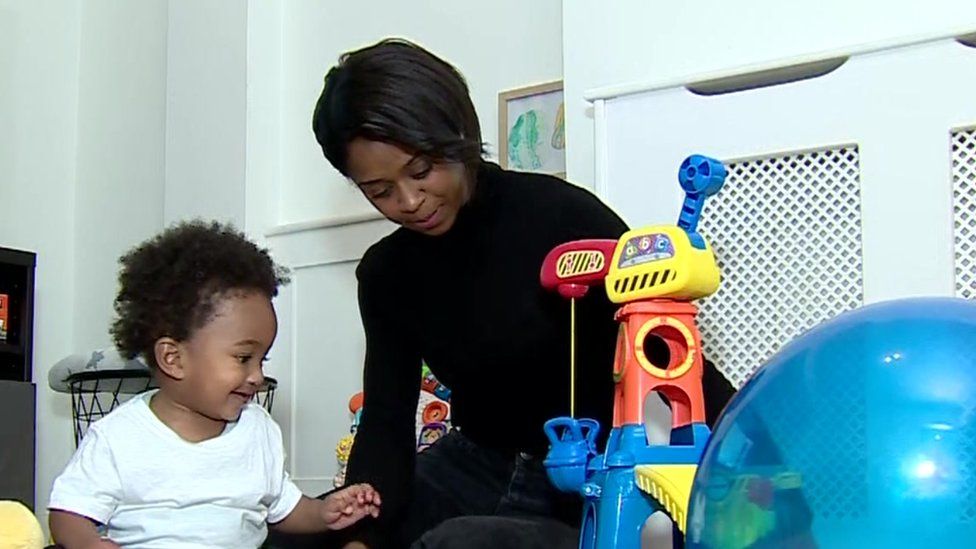
About a quarter of a million mothers with young children have left their jobs due to childcare pressures, research by an equal rights charity suggests.
Large numbers of women were missing out on career opportunities for the same reason, the research indicated.
More mothers are working than ever before, said the Fawcett Society.
But they were facing what amounted to a “motherhood penalty” as their careers weren’t progressing, it said.
A lack of flexible working arrangements and affordable childcare combined with “outdated and toxic attitudes around motherhood” were holding women back, said Jemima Olchawski, chief executive of the Fawcett Society.
“Women, once they have children, find it’s harder to progress or they’re forced into part-time or low-paid jobs below their skill levels,” she said.
Less than a third of working mothers with children under the age of four have the flexible working arrangements they need, the Fawcett Society said.
Its survey of 3,000 working parents of pre-schoolers, conducted jointly with recruitment firm Totaljobs, found that one in 10 mothers had handed in their notice, while twice that number had considered doing so.
Even mothers who decided to persevere felt they were held back by the twin demands of children and workplace, the results suggested.
It found 41% of the mothers surveyed had turned down a promotion or career development opportunity because they worried it would not fit with childcare arrangements. A high proportion of working fathers – 37% – said they had done the same.
“I do want my career to progress,” said Lauren Mckenzie, who lives in south London with her husband and two children aged six and eight months. Already a full-time manager, she is not sure about pushing for promotion at work.
She currently juggles work around her baby’s naptimes and part-time nursery place but can’t afford the £1,800 cost of putting him in full-time childcare. She also says she can’t be sure she won’t have to dash out to pick him up during the day if something goes wrong.
“I don’t feel I can fully commit sometimes to work because I have to make sure my child is looked after as well,” she told the BBC.
- Welsh parents want England’s childcare funding matched
- ‘I’ve had a spring in my step over free childcare’
- I really want another baby, but who can afford it?
Failure to employ and promote mothers was having an impact on the UK economy, the Fawcett Society said, by holding back productivity or the effectiveness of the workforce and it was making it harder to close the gender pay gap.
Businesses could “retain talent and combat ongoing skills shortages” by doing more to support women with young children, rather than consigning them to the “mummy track”, Ms Olchawski said.
“Right now, the UK simply cannot afford to let these talents go to waste,” she said.
Employers wrongly assumed that pregnant women and mothers were less interested in career progression, the Fawcett Society said. Three quarters remained just as ambitious, while nearly half said they were more ambitious, it said.
But two thirds said they felt their capabilities and contributions were sometimes undervalued or overlooked in the workplace.
The Fawcett Society said it was calling on the government and businesses to provide more support with childcare, including more flexible working arrangements and the creation of “genuinely family-friendly cultures”.
The government announced a funding package in the Spring Budget earlier this year which will increase free childcare provision for working parents in England in steps over the next two years.
A government spokesperson described it as “the single biggest investment in childcare in England’s history”. Once fully rolled out it will provide 30 hours of free childcare a week for children from nine months old to school age, costing £8bn a year.
“Our Flexible Working Bill requires employers to consider any requests and provide a reason before rejection, and we have launched a call for evidence to increase understanding of the role of informal flexible working in supporting employees, including parents,” the spokesperson added.

Are you quitting work or turning down opportunities because of childcare costs? Share your experiences by emailing haveyoursay@bbc.co.uk.
Please include a contact number if you are willing to speak to a BBC journalist. You can also get in touch in the following ways:
- WhatsApp: +44 7756 165803
- Tweet: @BBC_HaveYourSay
- Upload pictures or video
- Please read our terms & conditions and privacy policy
If you are reading this page and can’t see the form you will need to visit the mobile version of the BBC website to submit your question or comment or you can email us at HaveYourSay@bbc.co.uk. Please include your name, age and location with any submission.
Related Topics
- Flexible working
- Working parents
-
Parents want England’s childcare funding matched
-
15 August

-
-
‘I’ve had a spring in my step over free childcare’
-
18 March

-
-
I really want another baby, but who can afford it?
-
13 August

-
-
Childcare shortage warning as childminders quit
-
23 July

-





